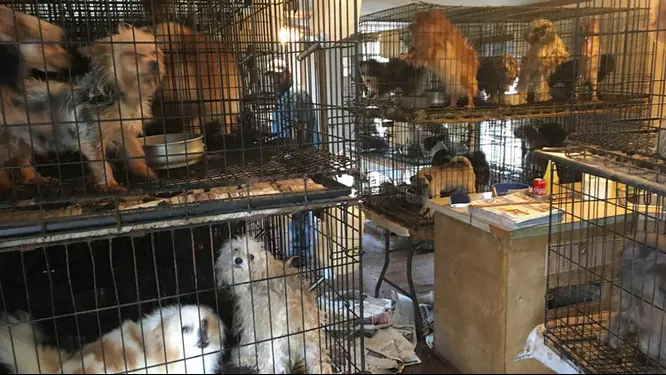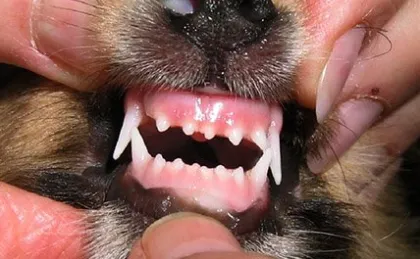Puppy mills are large-scale dog breeding operations designed for profit. With irresponsible and often unregulated breeding practices, they produce traumatized dogs who are vulnerable to infectious and genetic diseases.
At puppy farms, females are bred to exhaustion, while their puppies are quickly weaned and taken away early to begin the cycle again. Raids of illegal puppy mills often find cramped feces-ridden cages containing dogs with untreated injuries, infections, parasites, matted fur, and severe psychological trauma.

The deplorable conditions in a puppy mill: overcrowding, wire cages, no vet care, and no freedom.
How Do Puppy Mills Advertise?
Puppy mills vastly oversupply the pet trade, selling puppies via pet stores, online listings, Facebook, Craigslist, and Google Ads. But they don't identify themselves as puppy mills. They refer to themselves as dog breeders, kennels, even puppy farms. In short, any time you see an ad with puppies for sale, err heavily on the side of caution.
So when you're searching for a puppy, how can you tell if you're dealing with a puppy mill or an ethical breeder? And what exactly is the difference? Here are 6 warning signs of a puppy mill at work and exactly why they're bad.
1. Puppy Mills Produce Mix Breeds
Puppy mills aim to supply the pet trade with many options, including purebreds, crossbreeds, designer dogs, and miniature breeds. So what's the problem? Aren't crossbreeds supposed to be healthier because of their diluted gene pool?
If only it were that simple. Dog breeding is a science and an art. To understand that, we have to ask ourselves why do people breed dogs in the first place?

Ethical Breeders limit themselves to one or two dog breeds.
Besides seeking the ideal appearance and temperament, professional breeders pay a great deal of attention to health status, including in-born genetic diseases. Yet none of this factors in with puppy mills. They spare themselves the expense of genetic screening before they breed, so they have no idea what inherited diseases are passed on to puppies.
So what's the problem with crossbreeding dogs? It comes down to the end point. Puppy mills intentionally breed more dogs despite massive overpopulation problems. Every year, three million dogs are euthanized around the US because they can't be rehomed. Many are the products of puppy mills. Ignoring the immense suffering caused by overbreeding, puppy mills do it anyway simply because they can make a lot of money.
Such novelty crossbreeding is unthinkable to professional breeders, who produce litters only to maintain established purebreds. These were chosen historically for their intelligence, temperament, working ability, appearance, health, and longevity.
Today, professional breeders produce just enough dogs to maintain a healthy gene pool. They seek to breed champions, and only sell pet puppies which don't make the cut. This represents a fraction of the numbers in the puppy mill trade.
2. Puppy Mills Use False Advertising
Many puppy mills are unregulated and some are completely illegal due to their cruelty and neglect. It's common to keep multiple dogs in the same cage without opportunities to exercise or eliminate outside. The kennels are so unsanitary that puppy mills never want buyers to visit them on-site (as professional breeders so often do).
Instead, they execute their trades off-site, in car parks or other public spaces, suggesting it's for your convenience. They also ship scared puppies long-distance and use this as an excuse for non-contact.
When you see an online puppy listing, examine it with care. Look beyond the false advertising and forged AKC registration. Consider that the puppy photos are also likely fake. By the time you realize the puppy you bought is not the same one from the photo, the seller will be long gone.
If the puppy mill claims to perform genetic testing, make them prove it. There will be warning signs of falsification. Who ordered the DNA report? How long ago is it dated? Does the report list the name of the kennels you're dealing with? You can also ask what specific diseases they screen for—see Genetic Diseases in Shelties to gauge their breed knowledge.
3. Puppy Mills Have Many Litters Available
As commercial breeding facilities, puppy farms have numerous litters for sale year-round. While you won't know this without access to their kennels, you can check if they're advertising lots of puppies at once.
Dog litters are usually around 4-6 puppies, and producing more than two litters at once is a sign of commercial breeding. The puppies may belong to the same breed, or come from different pure and crossbreeds. This is definitive evidence the kennels are breeding for profit.
On the subject of kennel visits: without going to visit a breeder, there's no way to meet your puppy's parents. This is important so you can check they're healthy, have good temperaments, and that the mother has been well cared for throughout her pregnancy.
4. Puppy Mills Rehome Pups Before 8 Weeks
Puppy mills offer puppies for sale as young as 2 weeks old. This is not only horrendous for the puppy's emotional development, but deprives her of vital antibodies and fats from her mother's milk. Young puppies also need to learn how to interact with their littermates, so they can behave appropriately in social situations for the rest of their lives.
Young puppies also need a close primary attachment with their mother when they're still developing. From her, they learn how to form healthy attachments with dogs and humans. Separation from mom much before 7-8 weeks of age can lead to behavioral problems for the rest of their lives.
How will this look in a mill puppy? She'll shy away from contact and suffer from lifelong fear and anxiety. Her bond with you will be severely diminished, and her anxiety will manifest as skittishness or aggression around all potential threats, including adults, children, and babies.
5. Puppy Mills Sell into Pet Stores
We may associate pet store puppies with joy and innocence, but in the majority of cases today, they come directly from the puppy mill trade.
According to The Human Society, pet store puppies comes from all over the US. Many come from breeders with one or more Animal Welfare Act violations. This includes sick and injured dogs deprived of medical treatment, underweight dogs, cages covered in feces, and food contaminated by mold and insects.
Pet store puppies also suffer from serious health and psychological problems. And while some in-born diseases don't show up for months or years, pet store guarantees are carefully worded as to bypass liability for vet bills. Instead, they offer to replace (and euthanize) the animal you have come to love.
Nationwide, more than 2,300 pet stores have pledged to stop selling puppies. In some states, it's illegal. Don't ever think that you're saving a pet store puppy; this only fuels demand and condemns the mother to produce yet another litter.
6. Puppy Mills Have No Paperwork
Puppy mills only want one thing from you: your money. They don't care whether you plan to vaccinate your puppy against infectious diseases, desex them at the appropriate age, or arrange for annual vet checks.
They don't care what happens to the dog if you later decide you can't keep him, and will certainly not ask you to return him for rehoming. These are the kinds of conditions you'll agree with professional breeders.
What's more, puppy mills often fail to get their puppies vaccinated at 6-8 weeks, either because they've sold them younger, or simply spared the expense. If they claim to have vaccinated, ask for proof. There's always paperwork. Check the vaccine types, dates given, and get the vet clinic in question to verify.
As a general rule, when a puppy vendor is only interested in making a trade, and doesn't ask any questions as to your lifestyle or experience with dogs, it's a huge red flag.
How to Report a Puppy Mill
If you identify a puppy mill in your search for a puppy, file a report online at The Humane Society Puppy Mill Task Force or call 1-877-MILL-TIP. They investigate all information on possible crimes involving puppy mills, especially from those with insider knowledge. You can also file a complaint online with the USDA.
How to Find a Professional Sheltie Breeder
Search our directory of Sheltie breeders which extends to the US, UK, Canada, Australia, and New Zealand. We only list breeders dedicated to the Shetland Sheepdog breed and who are transparent about their kennels. As always, however, please due your own due diligence to avoid the cruelty of the puppy mill trade.
Remember that professional breeders:
- Produce few litters per year
- Seek to produce champions
- Focus on health and temperament
- Perform genetic screening
- Do vet checks and vaccinations
- Sell face-to-face at the kennels
- Are experts in a specific breed
- Produce countless litters per year
- Oversupply the pet trade
- Ignore genetic screening
- Ignore vet checks and vaccinations
- Forge certificates and photos
- Run crowded and unsanitary kennels
- Sell online or via pet stores
- Produce designer dogs and novelty pets









